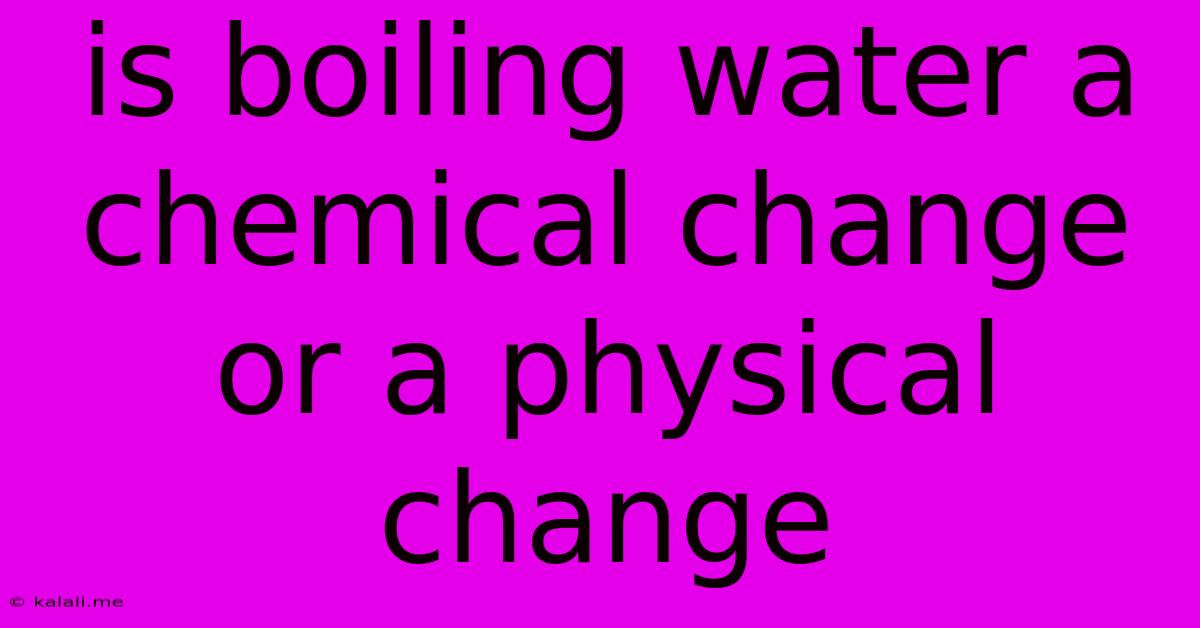Is Boiling Water A Chemical Change Or A Physical Change
Kalali
May 09, 2025 · 3 min read

Table of Contents
Is Boiling Water a Chemical Change or a Physical Change? A Comprehensive Look
Is boiling water a chemical change or a physical change? This seemingly simple question often trips up students and even seasoned science enthusiasts. The answer, however, lies in understanding the fundamental differences between these two types of changes. This article will delve deep into the process of boiling water, examining the evidence to definitively classify it. We'll also explore related concepts to solidify your understanding.
Boiling water is a physical change, not a chemical change. This is because the water molecule itself (H₂O) remains intact throughout the process. No new substance is formed. Let's break down why.
Understanding Chemical vs. Physical Changes
Before we analyze boiling water, it's crucial to define the key distinctions between chemical and physical changes.
-
Physical Change: A physical change alters the form or appearance of a substance but does not change its chemical composition. Examples include melting ice, tearing paper, or dissolving sugar in water. The substance remains the same at a molecular level.
-
Chemical Change: A chemical change, also known as a chemical reaction, results in the formation of one or more new substances with different chemical properties. Examples include burning wood, rusting iron, or baking a cake. The chemical bonds within the molecules are broken and reformed, creating entirely new compounds.
Evidence for Boiling Water as a Physical Change
Several key observations support the classification of boiling water as a physical change:
-
No new substance is formed: When water boils, it transitions from a liquid state to a gaseous state (steam). The molecules are further apart in the gaseous state, but they remain H₂O molecules. There's no creation of a new chemical compound.
-
The process is reversible: If you allow the steam to cool, it will condense back into liquid water. This reversibility is a hallmark of a physical change. Chemical changes are typically irreversible without further chemical processes.
-
No change in chemical properties: The chemical properties of water – its ability to dissolve certain substances, its reactivity with certain metals, etc. – remain unchanged after boiling.
Misconceptions and Clarifications
Some may argue that the change in state from liquid to gas is a significant alteration. While this is true, the crucial point is that the chemical identity of the water remains the same. The change is only in its physical state, not its chemical composition.
Related Concepts: Evaporation vs. Boiling
It's important to distinguish between boiling and evaporation. Both involve the transition of water from liquid to gas, but they differ in how they occur:
-
Boiling: Boiling occurs at a specific temperature (100°C at standard atmospheric pressure) and involves the formation of bubbles throughout the liquid.
-
Evaporation: Evaporation occurs at any temperature below the boiling point and only at the surface of the liquid.
Both boiling and evaporation are physical changes.
Conclusion
In conclusion, boiling water is definitively a physical change. The water molecules maintain their chemical identity throughout the process, transitioning only from a liquid to a gaseous state. While the change of state is significant, it doesn't involve the formation of new substances, a defining characteristic of chemical changes. Understanding this distinction is fundamental to grasping basic chemical principles.
Latest Posts
Latest Posts
-
80 Is What Percent Of 120
May 09, 2025
-
At What Temperature Does Your Blood Boil
May 09, 2025
-
Is Density A Chemical Or Physical Property
May 09, 2025
-
20 Kilograms Equals How Many Pounds
May 09, 2025
-
Baking Soda Is A Compound Or Element
May 09, 2025
Related Post
Thank you for visiting our website which covers about Is Boiling Water A Chemical Change Or A Physical Change . We hope the information provided has been useful to you. Feel free to contact us if you have any questions or need further assistance. See you next time and don't miss to bookmark.